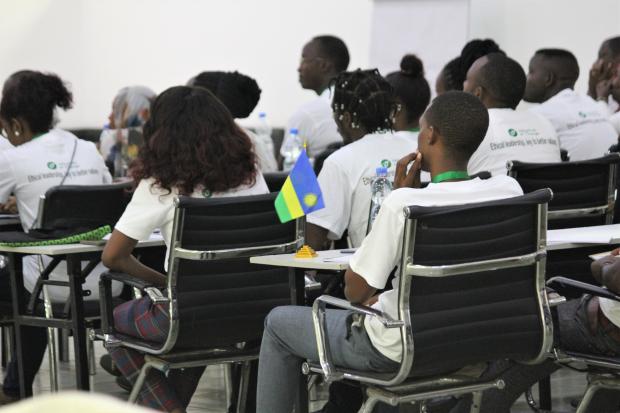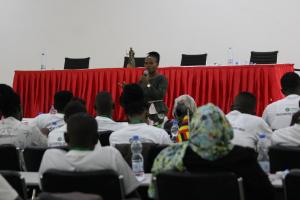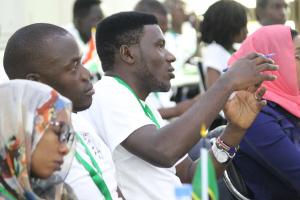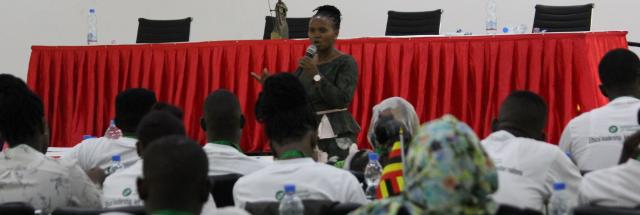Ethical Leadership, Key to Better Nations
 Fifty six youths gathered in Dar Es Salaam, Tanzania for the 6th Eastern Africa Youth Forum (EAYF6) under the them ‘Ethical Leadership, Key to Better Nations’. The forum ceremoniously kicked off at the venue, Serene Hotel on 3rd April with the East African Anthem followed by the host traditional dance by a Tanzanian group of dancers. The Forum brought together young leaders representing seven countries from the Eastern Africa bloc, namely Tanzania, Rwanda, Burundi, Sudan, South Sudan, Uganda and Kenya.
Fifty six youths gathered in Dar Es Salaam, Tanzania for the 6th Eastern Africa Youth Forum (EAYF6) under the them ‘Ethical Leadership, Key to Better Nations’. The forum ceremoniously kicked off at the venue, Serene Hotel on 3rd April with the East African Anthem followed by the host traditional dance by a Tanzanian group of dancers. The Forum brought together young leaders representing seven countries from the Eastern Africa bloc, namely Tanzania, Rwanda, Burundi, Sudan, South Sudan, Uganda and Kenya.
 Speaking during the official opening of the forum, Ms. Tike Mwabipile, head of the Tanzania Women Lawyers Association, said, “Youths in our nations should adopt the approach of ‘thinking outside the box’. In the environments where over-recycled, sit-tight leadership prevails, the persistent approach of youths thinking outside the box would fast-track positive change in leadership.”
Speaking during the official opening of the forum, Ms. Tike Mwabipile, head of the Tanzania Women Lawyers Association, said, “Youths in our nations should adopt the approach of ‘thinking outside the box’. In the environments where over-recycled, sit-tight leadership prevails, the persistent approach of youths thinking outside the box would fast-track positive change in leadership.”
The young delegates confirmed that their hope is to see a better led region with leaders who are fit to serve with leadership skills and capacity and not be hungry for power.
Mr. Joseph Badi and Mrs. Doscar Vuhahula were the IofC elders from Tanzania present at the opening ceremony. Mr. Badi, on behalf of IofC Tanzania gave his opening remarks. “It is a great honour for Tanzania to host the 6th EAYF. It is our pleasure as a country to be able to host such an amazing group of young people, full of energy and passionate to bring change in our nations.”
In the same session, Mr. Mayur Shah from India delivered the message from the President of IofC international, Mr. Suresh Vazirani, who expressed his gratitude to all participants and challenged everyone to be at the forefront of advocating for ethical leadership and best practices. In his message, he quoted Nelson Mandela, ‘There is no passion in living a small life.’ He further mentioned that “we must all strive to achieve our biggest role in life.” He emphasized Mahatma Gandhi’s quote, ‘Be the change you want to see in the world’ - be what we are meant to be. Mr. Vazarani further challenged the young delegates to lead positive lives to see the change we want. If we all do so, it is the beginning of a new world, he said.
 Mrs. Ann Kimanthi, shared her thoughts on understanding self. In her words, “Self-awareness is a core leadership skill and self-leadership is key.” She challenged the young leaders to begin looking into their hearts and evaluating their actions and motives in whatever they do. This is the starting point to creating positive change in the society. “You cannot give what you don’t have. If you have love, peace, joy, hate, gossip, this is what you are able to give comfortably.” She added, “It is therefore very important to fill our hearts with morals and a good set of values so as to influence the society positively. Ethical leadership is a practice of appreciating humanity. For us to achieve good leadership, it has to begin with us being good citizens. Being self-aware gives you an opportunity to be a transformational leader.”
Mrs. Ann Kimanthi, shared her thoughts on understanding self. In her words, “Self-awareness is a core leadership skill and self-leadership is key.” She challenged the young leaders to begin looking into their hearts and evaluating their actions and motives in whatever they do. This is the starting point to creating positive change in the society. “You cannot give what you don’t have. If you have love, peace, joy, hate, gossip, this is what you are able to give comfortably.” She added, “It is therefore very important to fill our hearts with morals and a good set of values so as to influence the society positively. Ethical leadership is a practice of appreciating humanity. For us to achieve good leadership, it has to begin with us being good citizens. Being self-aware gives you an opportunity to be a transformational leader.”
“Good people don’t need laws; they need caring leaders,” Reuben Ndimbo, an assistant lecturer at University of Dar Es Salaam shared with the young leaders. He shared his thoughts on who is perceived to be a good leader. “Good leaders care about people. They have zero tolerance for ethical violations and lead by example,” he shared.
One of the participants from Burundi shared that, in his business, he had fired one of his employees over malicious allegations. He reacted to the allegations thinking that it was the right thing to do. After some time, he realized that all that had been said to him against his staff were false. Sitting in the Forum session entitled, “Traits of an ethical leader,” he realized how much he hadn’t cared. He said that he would go back and recall the employee and apologize for his reactions.
 Kenyan, Mr. Dan Mugera, Principal Trainer of The African Centre for Public, speaking in response to a question posed by a participant on understanding the difference between management and leadership, said, “Managers ensures things are done right, but leaders ensure the right thing is done.” He further shared that, “one can be a manager and not a leader.” It is therefore very important for them in management to strive and be leaders. Leaders steer, navigate and show direction. They lead from the front. Mr. Mugera shared the analogy of a ship. He said, “the one who holds the steering wheel cannot function without the navigators. Holding onto a position of power is not a show of leadership. We have had many in power but they have steered their nations towards the wrong directions. It is important to guide the people you serve into the right direction and that way, you are perceived to be a leader.
Kenyan, Mr. Dan Mugera, Principal Trainer of The African Centre for Public, speaking in response to a question posed by a participant on understanding the difference between management and leadership, said, “Managers ensures things are done right, but leaders ensure the right thing is done.” He further shared that, “one can be a manager and not a leader.” It is therefore very important for them in management to strive and be leaders. Leaders steer, navigate and show direction. They lead from the front. Mr. Mugera shared the analogy of a ship. He said, “the one who holds the steering wheel cannot function without the navigators. Holding onto a position of power is not a show of leadership. We have had many in power but they have steered their nations towards the wrong directions. It is important to guide the people you serve into the right direction and that way, you are perceived to be a leader.
“To be an authentic leader you need to have purpose. To grow your purpose, you need to be focused, passionate, patient and courageous. Good leaders can be relied upon to deliver on their roles. Authentic leaders have compassion and are focused on promoting humanity. They have good character and always (strive to) do the right thing no matter the cost.”
As part of the community work activity, participants took part in a beach cleanup exercise, which served as an opportunity for the young people to engage with the environment.
The sixth EAYF ended on 6 April 2019 where the different teams from the countries represented committed to take up initiatives that will advocate for ethical leadership in their countries.
The organizers of the forum are grateful to the support from various stakeholders in making the forum a great success and to all participants who came out strongly to represent their countries. Many thanks to the Africa Coordinating Group, Sylvia Zuber Fund, Friends of Africa, Initiatives of Change Tanzania and the global Initiatives of Change or their continued support to the Eastern Africa Youth Forum.
-reporter Zachariah Muturi Karimi


